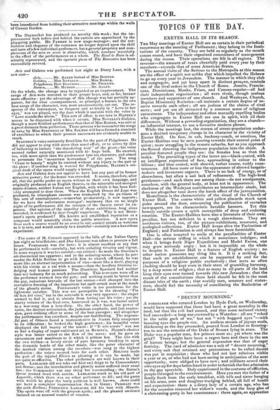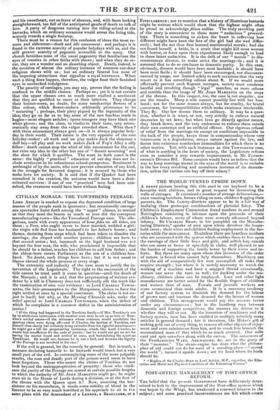"DECENT MOURNING."
A FOREIGNER who entered London by Hyde Park, on Wednesday, would have supposed that there had been a great mortality in the land, but that the evil had passed, and that some national victory had succeeded—a long war crowned by a Waterloo : all are "robed in the sable garb of wo," but not "with haggard eyes "—with beaming eyes the people run. An endless stream of joyous souls, thickening as the day proceeded, poured from London to Kensing- ton to see the remains of the Duke of Sosszx lying in state. The Duke was a popular man, few princes more so; yet where was the grief? There might have been a regret here and there in the sea of human beings; but the general expression was that of eager festivity. The card of admission was a suit of "decent mourning," and every suit that retained any pretensions to be called decent was put in requisition : those who had not lost relatives within a year or so, or who had not been saving in anticipation of the next opportunity, were obliged to have new; and milliners sewed their own eyes up for days beforehand in order to furnish the free admission to the gay spectacle. Duly caparisoned in the costume of affliction, people thronged to the entertainment. Here you met the father of a family fresh from the early breakfast, with wife and sister hanging on his arms, sons and daughter trudging behind, all full of bustle and expectation: there a solitary lady of a certain age, who has for the occasion resumed her widow's weeds, and the busy glee of a christening-party in her countenance : there again, an apprentice
and his sweetheart, out on leave of absence, and, with faces looking straightforward, too full of the anticipated gauds of death to talk of love. A party of dragoons turning into the riding-school at the barracks, which on ordinary occasions would arrest the living tide, scarcely retards a single footstep.
There must be a reason for this confusion of ideas the most re- mote and abhorrent—death and idle amusement: and perhaps it is found in the extreme scarcity of popular holydays with us, and the still greater scarcity of pageants accessible to the many. Our church furnishes none of the usual pageantry that familiarizes the eyes of votaries in other faiths with shows ; and when they do oc- cur, they are a wonder and an absorbing object. Death, indeed, is the occasion of almost the solitary instance of common out-door religious shows with us ; but an ordinary funeral has none of the imposing attractions that signalize a royal interment. When such a thing does happen, therefore, the vulgar feast their famished eyes in unchecked indulgence.
The paucity of carriages, you may say, proves that the feeling is confined to the middle classes. Perhaps so ; yet it is not certain that the upper classes own so much more exalted a sentiment that they are qualified to sneer at their inferiors. They change their bonnet-roses, no doubt, for some nondescript flowers of a lilac colour, which flower-makers arbitrarily pronounce to be " mourning" ; perhaps, their piety piqued by the ingenuity of the idea, they go so far as to buy some of the new fusebias made in bugles—most elegant articles ; opera-loungers may have black vice white gloves; and the class, to vindierte their taste, very aristo- cratically stay away from the vulgar crowded show. What then ? with them amusement always goes on—it is always popular holy- day in their world. Their estate is the very opposite of the rare bo13-day-maker: all work and no play makes Jack the shopman a dull boy—all play and no work makes Jack of Fop's Alley a silly fellow : death cannot stop the whirl of idle amusement for the one, nor raise any idea in the other but one of " decent mourning" and the show for which it qualifies. The want in both cases is the same: the highly "practical" education of our day does not in- clude sentiment in its voluminous school-prospectus. Sentiment is unthought of by the sects, who now prevent education of any kind, in the struggle for favoured dogmas; it is scouted by those who make laws for society. It is said that if the Quaker had been consulted in the creation, the universe would have been a drab- coloured universe: if one of our "practical" men had been con- sulted, the creatures would have been without feeling.



























 Previous page
Previous page